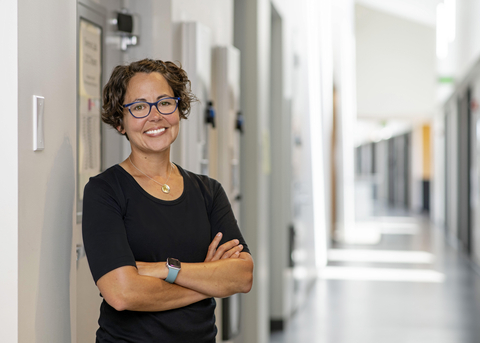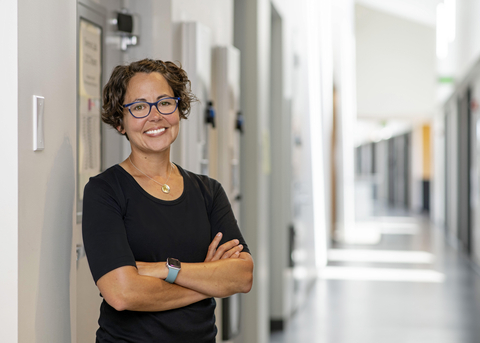DALLAS--(BUSINESS WIRE)--Colossal Biosciences, the world’s first de-extinction company, today announced that Beth Shapiro, Ph.D., internationally renowned evolutionary molecular biologist, leader in paleogenomics, and ancient DNA expert, has joined as Chief Science Officer. In this role, she will oversee the continued expansion of the company’s de-extinction and conservation science teams. She leaves her roles as Howard Hughes Medical Institute Investigator, Professor of Ecology and Evolutionary Biology, and lead of the Paleogenomics Lab at the University of California, Santa Cruz, effective March 15th.
“I’ve been an advisor to Colossal since just after the company launched and am excited now to step in full-time to support the team’s groundbreaking work,” shared Beth Shapiro. “It’s thrilling to see the research we’ve been doing in the labs not only seeing the light of day, but being applied to science that will positively impact the planet.”
In the past two years, as an advisor, Shapiro has contributed to Colossal by:
- Helping to launch the Dodo and Avian Genomics Group,
- Developing, along with numerous members of the Colossal team, the international scientific advisory board,
- And serving as the Lead Paleogeneticist, helping to secure samples and generate ancient DNA data that Colossal is using as part of all species groups.
A MacArthur “Genius Grant” Award winner and National Geographic Explorer, Beth Shapiro is a pioneer in the scientific fields of ancient DNA and paleogenomics. During her Ph.D. research, which she completed as a Rhodes Scholar at the University of Oxford, Shapiro generated the first DNA data from a dodo and used this to determine that this icon of human-caused extinction was actually a type of pigeon. She was also the first to ask population-scale questions using ancient DNA data, developing a suite of new experimental and computational tools to reveal that the American bison nearly went extinct along with other icons of the Ice Age including mammoths, North American horses, and giant bears. This work won her a coveted Royal Society University Research Fellowship, which she accepted along with a Senior Research Fellowship at Balliol College, Oxford, and the Directorship of the Henry Wellcome Biomolecules Centre. While at Oxford, Shapiro continued to break then-barriers in ancient DNA research, collaborating in projects to sequence the first whole genome from an extinct species – a mammoth – and the first DNA directly from sediments.
In 2007, Shapiro moved back to the U.S. to accept a faculty position in the Department of Biology at Penn State University. Her list of accolades during this part of her career includes being named a: Searle Scholar, Packard Fellow, PopTech Science and Public Leadership Fellow, National Geographic Explorer and placed on Smithsonian Magazine’s “37 Young American Innovators under the age of 36.”
At Penn State, Shapiro expanded her research program to include questions about plant and animal domestication, conservation, and the role of admixture between lineages as an evolutionary force.
Shapiro moved her research program to the University of California, Santa Cruz, in 2012, where she along with Dr. Richard “Ed” Green established the UCSC Paleogenomics Lab, which is today one of the leading ancient DNA research facilities in the world. By developing new experimental approaches to recover even the most trace amounts of surviving ancient DNA, Shapiro continues to reframe what is possible in this scientific field. Shapiro and her team have used their new tech to generate genomes from samples once believed to be too old – like the ancient long-horned bison that became extinct more than 100,000 years ago, and too poorly preserved – like the taxidermied remains of Balto, the famous sled dog – to retain recoverable DNA.
Shapiro has also focused increasingly on applying genomics approaches to aid management of endangered species and habitats, such as through her roles as Executive Committee member of the California Conservation Genomics Project and the Vertebrate Genomes Project. In 2019, Shapiro was selected as a Howard Hughes Medical Institute Investigator, joining an elite group of around 300 scientists from across the United States who are recognized for their track record of scientific innovation and discovery.
In her career thus far, Shapiro has published more than 200 peer-reviewed manuscripts, many in leading scientific journals such as Science, Nature, and Cell. She is an elected Fellow of the California Academy of Sciences and the American Association for the Advancement of Sciences, and her work spans technology development, basic ecological and evolutionary science, and applications of genomics, including for endangered species management and conservation.
Throughout her career, however, she has never been able to avoid the obvious question about paleogenomics: if we can sequence their genomes, can we bring extinct species back from the dead? In response, Shapiro has dedicated a significant portion of her time to exploring this question, with articles in the popular and scientific press, as part of a nationwide National Geographic Live! series, on television and in documentary films, and in her award-winning popular science books, How to Clone a Mammoth (2015 and 2020) and Life as We Made It (2021). Shapiro’s impressive and broad portfolio of scientific and public work led to her election in 2023 to the American Academy of Arts and Sciences, one of the nation’s oldest and most prestigious honorary societies.
“Beth and I have developed an incredible relationship over the past few years. I’m extremely impressed by her intellect, drive, and the rigor of her scientific research,” shared Colossal CEO Ben Lamm. “I know she will continue to push our scientific research programs further and is the best fit for the role. It’s a dream to work so closely with Beth, and I know our species leads feel the same.”
“It is so great to have Beth join as CSO, bringing her inventive spirit and her many achievements in ancient populations of avian and mammalian species,” shared George Church, Ph.D., Colossal Co-Founder and a world-renowned geneticist. “She’s the author of inspiring books 'How to Clone a Mammoth' and 'Life as We Made It,' plus an HHMI and MacArthur Fellow. She is a rare combination of charisma, scholarship and environmental dedication. A colossal pioneer.“
“I have worked with Beth for over 20 years and am continually impressed by her contributions to the field of paleogenetics. I cannot be more excited about Beth joining Colossal, as this will not only help accelerate Colossal's de-extinction efforts but will also provide an even more direct link between my ancient mammoth research and Eriona’s and George’s teams. I look forward to continuing our collaboration with Colossal to refine our target list of which genes make mammoths unique compared to other elephant lineages,” shared Love Dalen, Professor of Evolutionary Genetics at the Swedish Museum of Natural History, one of the research leaders at the Center for Palaeogenetics in Stockholm, and leading Woolly Mammoth expert.
“Beth has not only a distinguished background in leading cutting-edge research in the fields of ancient DNA and evolutionary genomics, but is also one of the leading authorities on all the various nuances needed for successful de-extinction events. In this regard, Colossal Biosciences could not have chosen a better person to help them set, and ultimately realize, their goals,” shared Tom Gilbert, director of the Danish National Research Foundation Center for Evolutionary Hologenomics and the group leader of the Hologenomics group at the GLOBE Institute.
“Colossal is working on the hardest and most critical problems in mammalian biology. Considering Beth's successes as an experimentalist, breakthrough scientist and scientific thought leader, she is an absolutely inspired choice to lead this effort,” shared Carlos Bustamante, American population geneticist, academic, and entrepreneur currently at Stanford and CEO of Galatea Bio, Inc. “Her addition is another step that cements Colossal as a dream team.”
ABOUT COLOSSAL
Colossal was founded by emerging technology and software entrepreneur Ben Lamm and world-renowned geneticist and serial biotech entrepreneur George Church, Ph.D., and is the first to apply CRISPR technology for the purposes of species de-extinction. Colossal creates innovative technologies for species restoration, critically endangered species protection and the repopulation of critical ecosystems that support the continuation of life on Earth. Colossal is accepting humanity's duty to restore Earth to a healthier state, while also solving for the future economies and biological necessities of the human condition through cutting-edge science and technologies. To follow along, please visit: www.colossal.com
WEBSITE & SOCIALS
Websites: www.colossal.com
Twitter: https://twitter.com/itiscolossal
Instagram: https://www.instagram.com/itiscolossal/
LinkedIn: https://www.linkedin.com/company/itiscolossal/
Facebook: https://www.facebook.com/itiscolossal
Hashtag: #itiscolossal




